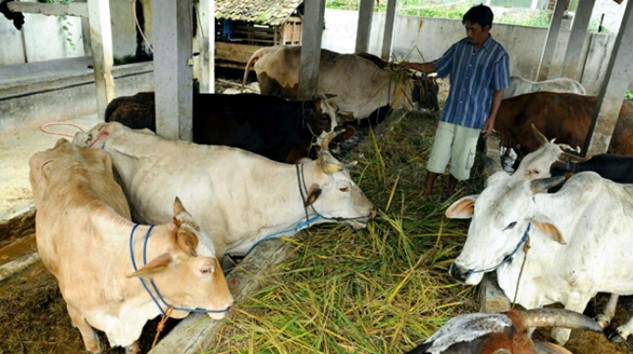
The Covid-19 pandemic is known to pose a risk to the community of smallholder named Margo Mulyo in Gunungkidul, especially in terms of marketing and social interaction with fellow farmers. During the pandemic, cows experienced a decrease in selling prices and direct interaction between farmers was hampered due to social distancing. However, this does not have a major impact on the livestock business they run.
This was stated by the lecturer and research team of the Faculty of Animal Science (Fapet) UGM chaired by Ir. F. Trisakti Haryadi, M.Sc., Ph.D., IPM on Monday (25/1) at Faculty of Animal Science UGM.
In his research, Trisakti found that the level of impact of the decline in selling prices on livestock business was classified as “medium” and the level of social risk impact on livestock business was classified as “very small”. Other researchers who are members of this study are Dr. Ir. Siti Andarwati, S.Pt., M.P., IPM. and Ni Made Ari Kusuma Dewi, S.Pt.
“This research is proof that even though it is small in scale, livestock businesses are able to survive in the face of disasters, including the Covid-19 pandemic. This reinforces the view that agricultural businesses including livestock can still continue to contribute to farming families even in times of crisis due to disasters. In fact, it can be used as an alternative job for those affected by the termination of employment, especially in the industrial sector,” said Trisakti.
In addition, Trisakti also found that the atmosphere of togetherness in a group is also an important characteristic for smallholders when running their business.
“This can be seen when all members of the Margo Mulyo livestock group state that limited interaction is a risk from the Covid-19 pandemic in running a business,” said Trisakti.
In dealing with these risks, Trisakti found that farmers have various abilities. Of the 23.5% of farmers who stated that marketing was a risk to their business, only half had a solution, by delaying the selling price of livestock until the selling price stabilized. Regarding the risk of social interaction, all farmers have a solution, by communicating via WhatsApp and direct or telephone interaction.
“The Margo Mulyo livestock group needs assistance to improve their ability to face social risks and decrease the selling price of livestock. Farmers need education in using more effective communication media to interact and support the livestock business they run,” said Trisakti.
The Dean of the Faculty of Animal Science UGM, Prof. Dr. Ir. Ali Agus, DAA., DEA., IPU., ASEAN. Eng said the source of the research funding was from the Faculty of Animal Science UGM as a form of scientific responsibility and a form of academic concern for the Covid-19 pandemic. (Nadia)
